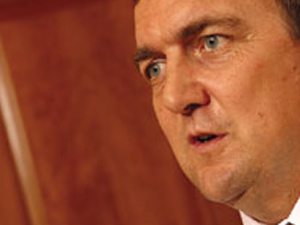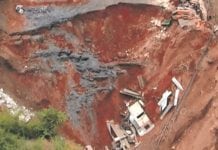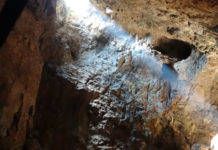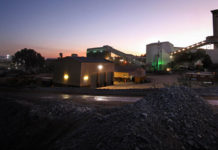
[miningmx.com] – RANDGOLD Resources, the £4.6bn UK-listed African
gold miner, said the $200/oz drop in the gold price during mid-April would not unseat
the company’s 950,000 ounce production target for the 2013 financial year.
This was despite the company having to trim 30,000 ounces of production at its Loulo-
Gountoko complex in Mali as it sought to lower capital expenditure and improve cash
flow.
The adjustment came amid a comprehensive review of the company’s operations, a
measure that has been undertaken by nearly all gold mining firms amid the pressure
on the dollar price of gold.
Mark Bristow, CEO of Randgold Resources, added that the group could even achieve
its 2015 production target earlier than 2015 despite market conditions which were
putting pressure on margins. “We’re well on track to get to 1.2 million ounces and we
could even beat that target by a year,” he said. He added that most of the company’s
projects were predicated on a gold price of $1,000/oz. There was no need to re-state
the company’s published resources and reserves.
Some analysts were sceptical of Randgold Resources’ short-term production targets,
however. “Guidance for group should reduce from 900-950koz (at cash costs of $700-
750oz) to 870-920koz,” said Investec Securities. It added, however, that despite
assuming lower production of 893,000 ounces production was “… still comfortably
within the revised range”.
But Bristow thought that if Kibali, the group’s new gold mine it is building in the
Democratic Republic of Congo (DRC) with AngloGold Ashanti, could be brought on
stream slightly earlier than planned, the output lost at Loulo-Gountoko could be
clawed back.
His optimism was also reflected in the 25% dividend payment which he added was
never in danger. “We are very comfortable with the dividend. The gold price would
have to change dramatically for us to change the dividend,’ he said.
“We are comfortably profitable at this gold price, and even at a lower gold price,’
Bristow said.
Nonetheless, the market took a dim view of Randgold Resources’ quarterly
performance. Shares in the company fell 2.45% on the London Stock Exchange after
the gold company today posted a 7% decline in first quarter gold production to
199,013 ounces and a 43% fall in first quarter profits.
Randgold Resources trades at a premium to most other African-focused gold stocks,
but Standard Bank Group Securities analyst, Michael Starke, maintained his firm’s
hold recommendation. This was despite Randgold Resources’ shares earnings coming
in at 76 US cents below consensus of 93c/share.
“A weaker quarter as expected and nothing to worry us here, with quarterly volatility
a norm,” said Numis Securities in a note to clients.
Bristow said current gold market conditions reflected “a return to reality’. He added
that the gold industry would have less flexibility which would lower gold production
and result in better businesses. “Look, a lot of people are going to lose money,
especially those who have been on this bandwagon with anything even remotely
connected with gold,’ he said.
As a result of margin pressure, Bristow thought there would be further opportunities
to set up joint venture with junior mining companies which had, to some extent,
competed with the company for exploration sites. Randgold Resources recently jointly
invested with Goldstone in Mali and in December,a joint venture with Kilo Goldmines
in the DRC.
Despite Bristow’s optimism, Randgold Resources has moved to cover its balance sheet
having nearly tied up a $200m revolving credit facility.
The gold price has recovered about 6% from its $1,380/oz level on April 16, but the
market commentators have been calling the price weakness the end of the bull
market for gold which extended for more than 10 years, notwithstanding recent
buying of physical metal.
Bristow had some choice words for professional investors as well as host country
governments, possibly in an attempt to deflect a degree of attention from the group’s
relatively poor performance in the first quarter.
“Investors should be focusing on long term returns instead of on the next quarter,
while host governments should not try to reap before they have sown,’ Bristow said in
comments to the published results.








